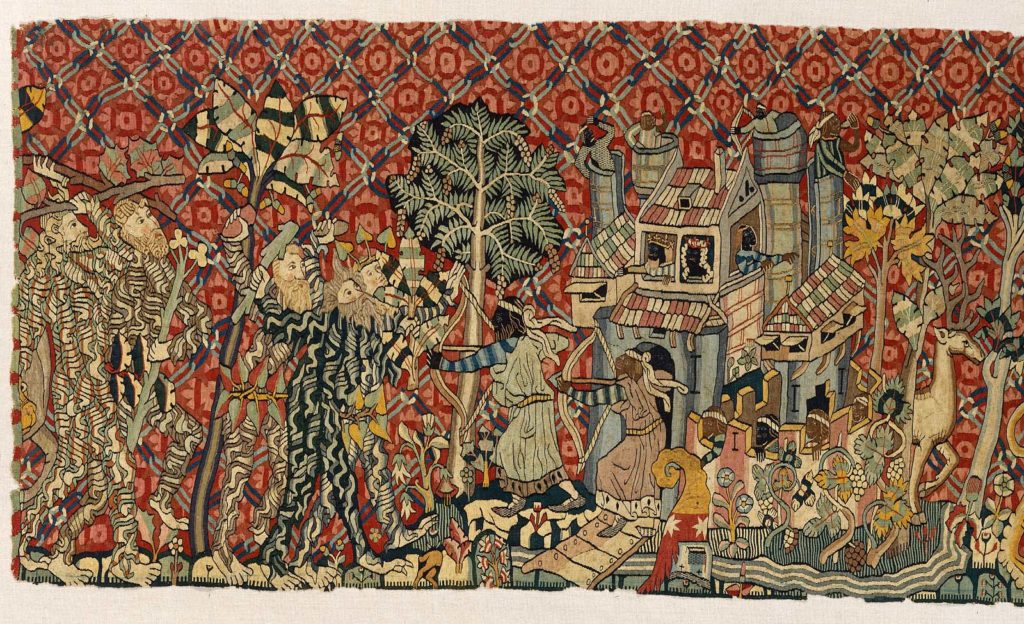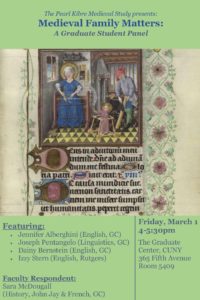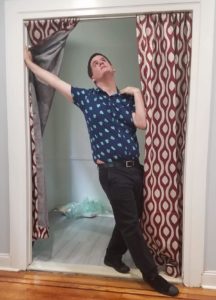2019-2020 PKMS Events
Check back on this website and on our Facebook page for updates!
September 13, Friday, 2019
Welcome Back + Business Meeting
6:00pm-7:00pm
Room 5105, The Graduate Center, CUNY
—
October 4, Friday, 2019
Workshop with David Perry
The Public Scholar in the Precarious University: A Workshop with David Perry
2:00pm-3:30pm
Room 5409, The Graduate Center, CUNY
—
December 20, Friday, 2019
End-of-Year Business Meeting
4:30pm-6:00pm
Room 5105, The Graduate Center, CUNY
—
early-February, 2020 (tentative)
Welcome Back + Business Meeting & Student Work-in-Progress Workshop
—
mid-March, 2020 (tentative)
Student Work-in-Progress Workshop
—
early-April, 2020 (tentative)
“Whan that Aprille Day” poetry event
—
May 1, Friday, 2020: Annual Conference
Working Through and Beyond the “Global Turn” in Medieval Studies
Keynote Speaker: Kathleen Davis, University of Rhode Island
PKMS 2020 Conference CFP: Working Through and Beyond the “Global Turn” in Medieval Studies
The 15th Pearl Kibre Medieval Study annual conference will consider the field of medieval studies beyond Eurocentrism and other tacit cultural, geographical, and temporal assumptions on the study of the Middle Ages, inviting scholars to engage in the “global turn” in medieval studies. The field of medieval studies suffers internally and externally from an image of narrowed focus; the perception that the field preoccupies itself solely on one culture, language, race, or religion. In recent decades, medieval scholars have sought to work against this perception and move beyond geographic, national, disciplinary, linguistic boundaries; pulling from multiple sources across a wide variety of languages, literatures, artifacts, and cultures to enrich their academic interrogations. Along with striving to include more diverse primary material, the field has also seen an increase in the variety of theoretical apparatus applied to the Middle Ages, such as critical race theory and post-colonial studies. The result of these efforts is the reshaping of ideas concerning the Middle Ages, no longer as a secluded and homogeneous time between Antiquity and the Renaissance, but a period of global cultural production in conversation with its predecessors and successors.
The 2020 PKMS conference will embrace this “global turn” in medieval studies, expanding upon the ongoing conversations concerning the insular perception of the Middle Ages and the constant struggles to escape the geopolitical and disciplinary confines of our field. We invite papers that take ‘global’ approaches to the studies in the Middle Ages, geographically, methodologically, and/or pedagogically. We also particularly welcome papers that reassess the geographical and temporal confines of medieval studies as a discipline. We invite proposals for intersectional and/or interdisciplinary papers in medieval studies from all disciplines, regions, languages, methodologies, theoretical approaches, etc. We also welcome proposals for papers on the practical aspects, challenges, and benefits of interdisciplinary and intersectional work in medieval studies.
Submit 250-word abstracts to [email protected] by January 31, 2020.
Potential topics include, but not limited to:
Geography, Nations and Borders in and about the “Global Middle Ages”
- Studies in early globalization
- Merits (and vice versa) of studies in the Global Middle Ages
- Decentering Europe in the study of the Middle Ages
- Disrupting the notion of Translatio Imperii
- The exclusion of figures within limited national boundaries
- The relationship (power dynamic) between the Western and Eastern Middle Ages.
- The exclusion of the African Middle Ages in mainstream medievalism
Historicity and Historical Narratives in and about the “Global Middle Ages”
- Global inheritance of medieval thought
- Re-classifying temporal categorization (the Middle Ages, but in the middle of what and where?)
- Diversity (cultural, religious, literary, political, economic) in the Middle Ages stemming from global relationships
Literature and Language in and about the “Global Middle Ages”
- Polylingualism
- Comparative analysis on a global scale
- Perspectives on the ‘global literature’
- The claiming of bodies/characters for national use
- Culture erasure/editing in medieval literature and contemporary criticism
Pedagogy of the “Global Middle Ages”
- Teaching a “global” Middle Ages
- The defense or denial of euro-/white-centrist works/organizations
- Theorizing the idea of “global” in medieval studies
- The “Global Middle Ages” as an interdisciplinary approach to medieval studies
- What does the “global” Middle Ages (or medieval studies) mean for euro-medievalists, or for Early English medievalists?
- New theoretical approaches to established texts
October 4, 2019: The Public Scholar in the Precarious University, a workshop with David Perry
The Public Scholar in the Precarious University: A Workshop with David Perry
Friday, October 4, 2019, 2:00pm-3:30pm
Room 5409, The Graduate Center, CUNY
https://www.centerforthehumanities.org/programming/the-public-scholar-in-the-precarious-university
Should academics go public? How does it work? What are the risks of speaking out? What are the risks of being silent? What are the benefits? How to go about it? David Perry, a widely-published journalist and historian, will speak about the perils and promises of breaking out of the Ivory Tower in this networked age, then lead the group in a workshop where they think about their own public voice.
David Perry is a journalist and medieval historian. After receiving a PhD from the University of Minnesota in 2006, David was a professor of history at Dominican University in the Chicago area. His book, Sacred Plunder: Venice and the Aftermath of the Fourth Crusade (Penn State University Press in 2015) explores the construction and contests over the memorialization of the Fourth Crusade as revealed in texts about the movement of relics from East to West. Since 2013, David has published over 400 essays in numerous outlets, including CNN, The Washington Post, The Atlantic, Pacific Standard, and The Nation. His journalism covers contemporary politics, parenting, health justice, higher education, and the myriad ways that history informs the present.
Co-sponsored by Pearl Kibre Medieval Study, the Medieval Studies Certificate Program, PublicsLab and the Center for the Humanities at the Graduate Center, CUNY
The workshop will be followed by David Perry’s evening talk at 7:30pm for Medieval Club of New York in the English Department Lounge, Room 4406, on “Online Fanboys, Medievalism, and Global White Supremacy,” co-sponsored by Medieval Club of New York, the Russell Hope Memorial Fund, PublicsLab, and the Center for the Humanities. The full description for the talk “Online Fanboys, Medievalism, and Global White Supremacy” is here.
Crossing Boundaries: Program
Conference Schedule
Friday, May 3, 2019
The CUNY Graduate Center
365 5th Avenue
New York, NY 10016
Room 5409

8:30am-9:00am Registration & Breakfast
9:00am-10:15am Panel #1: Crossing TEMPORAL Boundaries
Moderator: Dainy Bernstein
Fate, Faust, and Magical Girls: Japanese Reception of German Medievalism through the Case of Puelli Magi Madoka Magicka
William Arguelles, GC
Crossing the Irish Border: Towards an Understanding of Ireland’s Early Medieval Sculptural Heritage
Megan Henvey, University of York
10:15am-10:25am Coffee Break
10:25am-11:40am Panel #2: Crossing AESTHETIC Boundaries
Moderator: Robin Hizme
“Luminous and Gracefully Decorated”: A Guided Reading of the Armenian Lives of the Fathers
Earnestine Qiu, Tufts University
Le Roman de la Rose and the Dialectic of Vices: Text and Image
Cortney Berg, Arizona State University
“In swich Englissh as he kan”: A Study of Chaucer’s Vernacular
Wesley Boyko, Vanderbilt University
11:40am-11:50am Coffee Break
11:50am-1:05pm Panel #3: Crossing NORMATIVE Boundaries
Moderator: Jennifer Alberghini
The Precarious Language of Madness in Thomas Hoccleve’s Complaint
Emily Price, GC
The Well Behaved Rarely Make History: A Case Study of Cross-Dressing in Regard to Sodomy Laws and Gender Constructions in the High and Late Middle Ages
Margaret Paz, San Francisco State University
“How Can I Know if This is Truly a Sickness, or Something Else?”: Medieval Epistemology of Humoral Imbalance of the Love-Sick Body in Cligès
Miranda Hajduk, GC
1:05pm-2:10pm Lunch Break
2:10pm-3:10pm Roundtable: Teaching Across Boundaries in Medieval Classes
Moderator: Steven Kruger, Queens College and GC
Kristina Richardson (History, Queens College), Jennifer Ball (Art History, Brooklyn College and GC), Abby Kornfeld (Art History and Jewish Studies, City College of New York), Lauren Mancia (History, Brooklyn College)
3:10pm-3:20pm Coffee Break
3:20pm-4:35pm Panel #4: Crossing CULTURAL Boundaries
Moderator: William Arguelles
Tristan and the Medieval World
Mark-Allan Donaldson, GC
Majority in Number, Minority in Status, the Legacy of Byzantium in Islamic State Administration
Aliya Abdukadir Ali, Exeter University
Gender, Disability, and Jews in the Old English “Elene”: Intersections
Heide Estes, Monmouth University
4:35-4:45pm Coffee Break
4:45pm-5:45pm Keynote
Moderator: Soojung Choe
Of Saracens and Their Objects in the Epic: Translation, Association, Desire
Shirin Khanmohamadi, San Francisco State University
5:45pm Reception
Medieval Family Matters: A Graduate Student Panel

Friday, March 1
4-5:30pm
The Graduate Center, CUNY
365 Fifth Avenue
Room 5409
Featuring:
- Jennifer Alberghini (English, GC)
- Joseph Pentangelo (Linguistics, GC)
- Dainy Bernstein (English, GC)
- Izzy Stern (English, Rutgers)
Faculty Respondent:
Sara McDougall (History, John Jay & French, GC)
William Arguelles, English
 William Arguelles is a doctoral student here in the English department, working on Medieval Literature, History, and Women and Gender Studies. His research specifically looks into the relationship between Gender and Government in later Medieval England, as represented in historical and literary sources, with a critical lens towards queenship. His work aims to examine the role of women within the monarchial system, specifically focusing on the power dynamics inherent in the consort-monarch relationship, and the accompanying stereotypes and anxieties around women’s influence over governance, both then and now.
William Arguelles is a doctoral student here in the English department, working on Medieval Literature, History, and Women and Gender Studies. His research specifically looks into the relationship between Gender and Government in later Medieval England, as represented in historical and literary sources, with a critical lens towards queenship. His work aims to examine the role of women within the monarchial system, specifically focusing on the power dynamics inherent in the consort-monarch relationship, and the accompanying stereotypes and anxieties around women’s influence over governance, both then and now.
A graduate of Hunter College’s Thomas Hunter Honors Program and the Macaulay Honors College with a BA in English and Psychology, Will is a long-time CUNY veteran and advocate who currently works with the Office of Educational Opportunity & Diversity at the GC to help mentor upper level students in the CUNY system through the Pipeline Program.
Race and Religion in the Middle Ages: A Roundtable
Join us for a roundtable of graduate students discussing their work on race and religion in the Middle Ages.
Wednesday, December 12, 6-8pm
The Graduate Center, CUNY
Room 5409

Featuring:
Mark-Allan Donaldson: studying medieval texts without ignoring the presence of racial tension and representation.
William Arguelles: the essentially connected nature of the feminine and dynasty, and medieval imperialism.
Paola Maria Rodriguez: pagan characters in Dante’s Purgatorio.
Soojung Choe: shifting modes of representation of ‘Saracens’ from medieval romance to early modern theatre.
PKMS 2019 Conference CFP: Crossing Boundaries
Crossing Boundaries: Towards an Interdisciplinary Medieval Studies
Date: May 3, 2019
Location: The Graduate Center, CUNY
Keynote Speaker: Shirin Khanmohamadi, San Francisco State University
The Pearl Kibre Medieval Study’s 14th annual conference in May will showcase a variety of scholarship with interdisciplinary or intersectional approaches. It will also consider the field of medieval studies in light of recent conversations such as those about Eurocentrism, racism, sexism, homophobia, and transphobia at Leeds and Kalamazoo. It will specifically seek to open spaces for graduate students and other potentially vulnerable members of academia to engage with the recent debates and other complicated and controversial topics.
The 2018 PKMS conference explored the relationship between French and English departments, literatures, and cultures. The 2017-2018 workshop series focused on decentralizing Europe in medieval studies in our research and teaching. Medieval scholars often work across disciplines, but the institutional lack of communication across disciplinary borders has become more apparent recently, and the need to collapse those borders more urgent. The 2019 PKMS conference will expand those conversations beyond England and France, bringing together medieval scholars who work in various disciplines and with various methodologies for this day-long conversation, as the culmination of a year of graduate-student workshops on interdisciplinarity and intersectionality in medieval studies.
We invite proposals for intersectional and/or interdisciplinary papers in medieval studies from all disciplines, regions, languages, methodologies, theoretical approaches, etc. We also welcome proposals for papers on the practical aspects, challenges, and benefits of interdisciplinary and intersectional work in medieval studies. Submit 250-word abstracts to [email protected] by December 31, 2018 JANUARY 31, 2019.
Topics may include, but are not limited to:
- Spatial, temporal, and disciplinary boundaries in medieval studies
- The history of medieval studies
- The “Global Middle Ages”
- Global views of the European Middle Ages
- Working with multiple languages
- Working with translations and editions
- Medieval translations and adaptations of texts
- Studies in comparative religion
- The politics of medievalism
- Legal status of women in various regions, religions, etc.
- Representations of women across multiple contexts
- Medieval studies and a method of colonization
- Similar traditions in Western and non-Western contexts
- Digital Humanities in medieval studies
- Medievalists and medicine / medieval medicine
- Dis/ability in the Middle Ages
- Medievalists teaching non-medieval topics and texts
- Later uses of medieval music, art, and motifs
- Medieval ideologies and constructions of identity surrounding gender, sexuality, race, ethnicity, religion, and social class
CFP: Race and Religion in the Middle Ages
The Pearl Kibre Medieval Study
Call for Papers
Race and Religion in the Middle Ages:
An Interdisciplinary Roundtable and Workshop
Wednesday, December 12, 2018
6-8pm
This roundtable will feature students from various disciplines discussing their work on race and religion in the Middle Ages.
To submit a proposal for a five-to-ten-minute presentation, email a 100-word abstract to [email protected] by Friday, November 30, 2018.
Potential topics:
- race and religion in medieval thought
- religious world-maps
- contemporary scholars and medieval race
- racism in medieval studies
- conversion and conversion narratives
- interfaith marriage and relationships
- inter-religious interactions and perceptions
- whiteness and perceived whiteness
- medieval race in the modern consciousness
November 27: Guest Lecture, Carissa Harris
Voicing Violence:
Reading Rape Survival Narratives from the Medieval Pastourelle to the Daniel Holtzclaw Case
Carissa Harris
Temple University
November 27, 6-8pm
The Graduate Center, CUNY
Room 5409
Emily Price, English
Medieval theories of emotion, manuscript studies, disability studies, medieval medicine
Clare Wilson, History
Occitania, troubadours, crusades
Miranda Hajduk, English
Queer theory, disability studies, late medieval
Rebecca Wiegand Coale, Music
12th and 13th century French sacred music, secular music, theology
Soojung Choe, English
late medieval English literature; romance; gender (and masculinities) studies; medievalism
2018-2019 Events
Check back on this website and on our Facebook page for updates!
October 10: Student Workshop
Medievalist Methods: An Interdisciplinary Workshop
6-8pm
Room 5409
—
November 27: Guest Lecture
Carissa Harris, “Voicing Violence: Reading Rape Survival Narratives from the Medieval Pastourelle to the Daniel Holtzclaw Case.”
6-8pm
Room 5409
—
December 12: Student Roundtable / Workshop
Race and Religion in the Middle Ages
6-8pm
—
March 1: Student Roundtable / Workshop
Medieval Family Matters: A Student Roundtable
—
April 1:
“Whan that Aprille Day” poetry event
—
May 3: Annual Conference
“Crossing Boundaries: Toward an Interdisciplinary Medieval Studies”
Keynote Speaker: Shirin Khanmohamadi, San Francisco State University

